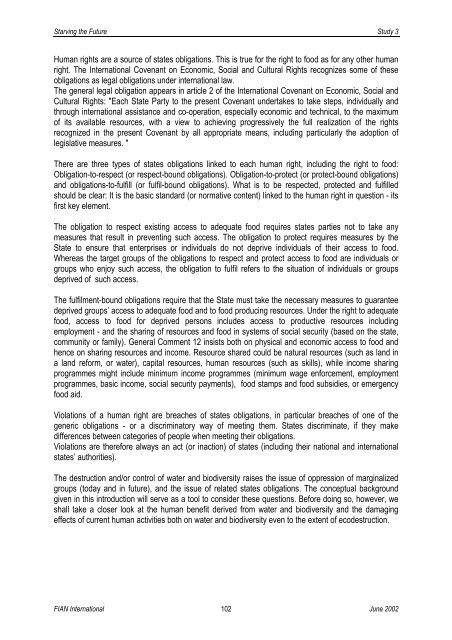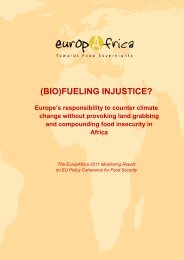Study 3: Ecodestruction and the Right to Food: The Cases of Water ...
Study 3: Ecodestruction and the Right to Food: The Cases of Water ...
Study 3: Ecodestruction and the Right to Food: The Cases of Water ...
You also want an ePaper? Increase the reach of your titles
YUMPU automatically turns print PDFs into web optimized ePapers that Google loves.
Starving <strong>the</strong> Future <strong>Study</strong> 3<br />
Human rights are a source <strong>of</strong> states obligations. This is true for <strong>the</strong> right <strong>to</strong> food as for any o<strong>the</strong>r human<br />
right. <strong>The</strong> International Covenant on Economic, Social <strong>and</strong> Cultural <strong>Right</strong>s recognizes some <strong>of</strong> <strong>the</strong>se<br />
obligations as legal obligations under international law.<br />
<strong>The</strong> general legal obligation appears in article 2 <strong>of</strong> <strong>the</strong> International Covenant on Economic, Social <strong>and</strong><br />
Cultural <strong>Right</strong>s: "Each State Party <strong>to</strong> <strong>the</strong> present Covenant undertakes <strong>to</strong> take steps, individually <strong>and</strong><br />
through international assistance <strong>and</strong> co-operation, especially economic <strong>and</strong> technical, <strong>to</strong> <strong>the</strong> maximum<br />
<strong>of</strong> its available resources, with a view <strong>to</strong> achieving progressively <strong>the</strong> full realization <strong>of</strong> <strong>the</strong> rights<br />
recognized in <strong>the</strong> present Covenant by all appropriate means, including particularly <strong>the</strong> adoption <strong>of</strong><br />
legislative measures. "<br />
<strong>The</strong>re are three types <strong>of</strong> states obligations linked <strong>to</strong> each human right, including <strong>the</strong> right <strong>to</strong> food:<br />
Obligation-<strong>to</strong>-respect (or respect-bound obligations). Obligation-<strong>to</strong>-protect (or protect-bound obligations)<br />
<strong>and</strong> obligations-<strong>to</strong>-fulfill (or fulfil-bound obligations). What is <strong>to</strong> be respected, protected <strong>and</strong> fulfilled<br />
should be clear: It is <strong>the</strong> basic st<strong>and</strong>ard (or normative content) linked <strong>to</strong> <strong>the</strong> human right in question - its<br />
first key element.<br />
<strong>The</strong> obligation <strong>to</strong> respect existing access <strong>to</strong> adequate food requires states parties not <strong>to</strong> take any<br />
measures that result in preventing such access. <strong>The</strong> obligation <strong>to</strong> protect requires measures by <strong>the</strong><br />
State <strong>to</strong> ensure that enterprises or individuals do not deprive individuals <strong>of</strong> <strong>the</strong>ir access <strong>to</strong> food.<br />
Whereas <strong>the</strong> target groups <strong>of</strong> <strong>the</strong> obligations <strong>to</strong> respect <strong>and</strong> protect access <strong>to</strong> food are individuals or<br />
groups who enjoy such access, <strong>the</strong> obligation <strong>to</strong> fulfil refers <strong>to</strong> <strong>the</strong> situation <strong>of</strong> individuals or groups<br />
deprived <strong>of</strong> such access.<br />
<strong>The</strong> fulfilment-bound obligations require that <strong>the</strong> State must take <strong>the</strong> necessary measures <strong>to</strong> guarantee<br />
deprived groups’ access <strong>to</strong> adequate food <strong>and</strong> <strong>to</strong> food producing resources. Under <strong>the</strong> right <strong>to</strong> adequate<br />
food, access <strong>to</strong> food for deprived persons includes access <strong>to</strong> productive resources including<br />
employment - <strong>and</strong> <strong>the</strong> sharing <strong>of</strong> resources <strong>and</strong> food in systems <strong>of</strong> social security (based on <strong>the</strong> state,<br />
community or family). General Comment 12 insists both on physical <strong>and</strong> economic access <strong>to</strong> food <strong>and</strong><br />
hence on sharing resources <strong>and</strong> income. Resource shared could be natural resources (such as l<strong>and</strong> in<br />
a l<strong>and</strong> reform, or water), capital resources, human resources (such as skills), while income sharing<br />
programmes might include minimum income programmes (minimum wage enforcement, employment<br />
programmes, basic income, social security payments), food stamps <strong>and</strong> food subsidies, or emergency<br />
food aid.<br />
Violations <strong>of</strong> a human right are breaches <strong>of</strong> states obligations, in particular breaches <strong>of</strong> one <strong>of</strong> <strong>the</strong><br />
generic obligations - or a discrimina<strong>to</strong>ry way <strong>of</strong> meeting <strong>the</strong>m. States discriminate, if <strong>the</strong>y make<br />
differences between categories <strong>of</strong> people when meeting <strong>the</strong>ir obligations.<br />
Violations are <strong>the</strong>refore always an act (or inaction) <strong>of</strong> states (including <strong>the</strong>ir national <strong>and</strong> international<br />
states’ authorities).<br />
<strong>The</strong> destruction <strong>and</strong>/or control <strong>of</strong> water <strong>and</strong> biodiversity raises <strong>the</strong> issue <strong>of</strong> oppression <strong>of</strong> marginalized<br />
groups (<strong>to</strong>day <strong>and</strong> in future), <strong>and</strong> <strong>the</strong> issue <strong>of</strong> related states obligations. <strong>The</strong> conceptual background<br />
given in this introduction will serve as a <strong>to</strong>ol <strong>to</strong> consider <strong>the</strong>se questions. Before doing so, however, we<br />
shall take a closer look at <strong>the</strong> human benefit derived from water <strong>and</strong> biodiversity <strong>and</strong> <strong>the</strong> damaging<br />
effects <strong>of</strong> current human activities both on water <strong>and</strong> biodiversity even <strong>to</strong> <strong>the</strong> extent <strong>of</strong> ecodestruction.<br />
FIAN International 102<br />
June 2002
















